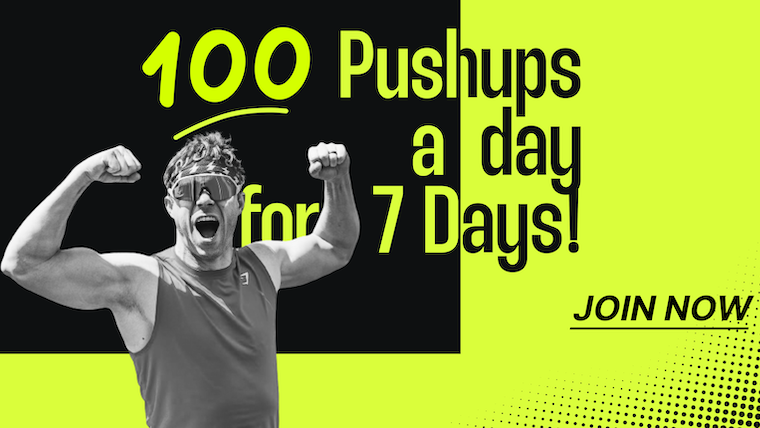Cadoo Announces Push-Up Challenge Featuring Formguru’s "Computer Vision" Technology (Brought to You by Cadoo)
Cadoo is a fitness app that allows its users to bet money on a fitness challenge that they then participate in. If the user successfully completes the challenge within the allotted time frame, they earn back their entry fee plus a proportional share of the prize pool comprised of the entries of those who failed the challenge.
The U.S. tech start-up launched this challenge mode in March 2020. Many of the challenges revolved around running or walking due to the limitations of what wearable technology could legitimately track. After all, if money is on the line, participants will expect fair standards across the challenges. That is about to change.
From June 1-7, 2022, Cadoo will host the Nick Symmonds Challenge — named after the decorated American middle-distance track athlete — which tasks participants to perform 100 push-ups for seven consecutive days. Each participant’s repetitions will be verified via artificial intelligence. The entry fee is $25.
Cadoo

Cadoo
Put your money where your fitness is by placing wagers on fitness challenges you then attempt. Complete them and earn your money back, plus a pro-rata share of the prize pool.
Get Cadoo
How can Cadoo suddenly verify movements like push-ups, a movement wearable technology cannot register? It’s possible thanks to the computer vision technology provided by the Formguru app, which can track bodyweight and weightlifting movements. This significantly expands the kinds of fitness challenges Cadoo can host in the future.
Participating athletes film their push-ups for the Nick Symmonds challenge, upload the video to Formguru, and it will analyze the push-ups and verify them. Since this is Cadoo’s premiere challenge utilizing Formguru’s technology, Cadoo is sweetening the prize pool by tacking on an additional $1,000.
Put Your Money Where Your Fitness Is
If you’re not the betting type, you might be leaving some potential in training on the table. According to a systematic review in 2015 of 10 randomized controlled trials by the Annals of Behavioral Medicine, "monetary incentive programs can be successful, at least in the short term, for increasing participation in exercise programs." (1)

While the effectiveness of those incentives in the long-term isn’t entirely clear, "short term" is what Cadoo’s fitness challenges could be described as. Each challenge has a timeframe participants need to complete said challenge by.
A more recent study in 2021 by the Journal of Preventive Medicine and Hygiene found that 103 women with a body mass index (BMI) greater than 30 lost an average of 3.12 points on their BMI after 12 months when receiving a financial incentive to lose weight. The researchers concluded that "financial incentives can effectively help to weight loss and maintenance of weight, and improve lipid profiles; blood sugar and liver enzymes." (2)
Of note, financial incentives only seem to work when they are conditional. A systemic review in 2017 of 12 studies in Behavioral Medicine found that "rewards seem to have positive effects on physical activity, while unconditional incentives seem to have no effect." An unconditional incentive means participants received the reward even if they did not perform the suggested physical activity. (3)
Proper Push-Ups
Assuming you are game to sign up for Cadoo and compete in the Nick Symmonds Challenge, you’ll need to know how to perform a push-up with proper form.
Even though it’s often considered a beginner movement, it’s not uncommon for people to perform them incorrectly. This could lead to a higher risk of shoulder and/or elbow injury while not even getting the physical benefits of the movement. Here’s how to perform a push-up properly:
Step One: Assume a plank position with the shoulders positioned directly over the wrists, the core is engaged (think about tilting the pelvis forward toward the shoulders), and the shoulders, hips, knees, and ankles form a straight line.
Step Two: Descend toward the floor by bending at the elbow without allowing any give to the rigidity of your plank position. Your upper body and lower body should move synchronistically as you lower to the floor, with your chest, quads, and hips all touching the ground simultaneously.
Step Three: When you exhale and push-up to the starting position, think about trying to touch your elbows together rather than simply pushing away from the floor. This cue can help better engage your pecs (shortening the pecs’ fibers) rather than applying excess stress to the shoulder joints.
Cadoo

Cadoo
Put your money where your fitness is by placing wagers on fitness challenges you then attempt. Complete them and earn your money back, plus a pro-rata share of the prize pool.
Get Cadoo
Maintain bracing in the upper back throughout the entire exercise, and you will have performed a clean push-up.
You can download the Cadoo app and try it out for yourself by going to Cadoo’s website.
References
- Strohacker, K., Galarraga, O., & Williams, D. M. (2014). The impact of incentives on exercise behavior: a systematic review of randomized controlled trials. Annals of behavioral medicine : a publication of the Society of Behavioral Medicine, 48(1), 92–99. https://doi.org/10.1007/s12160-013-9577-4
- Pasdar, Y., Najafi, F., Darbandi, M., Rezaeian, S., Niazi, P., & Hamzeh, B. (2021). Financial incentive strategy for weight loss and maintenance of weight loss. Journal of preventive medicine and hygiene, 62(1), E206–E212. https://doi.org/10.15167/2421-4248/jpmh2021.62.1.1721
- Barte, J., & Wendel-Vos, G. (2017). A Systematic Review of Financial Incentives for Physical Activity: The Effects on Physical Activity and Related Outcomes. Behavioral medicine (Washington, D.C.), 43(2), 79–90. https://doi.org/10.1080/08964289.2015.1074880
Deja una respuesta

►Te puede interesar...